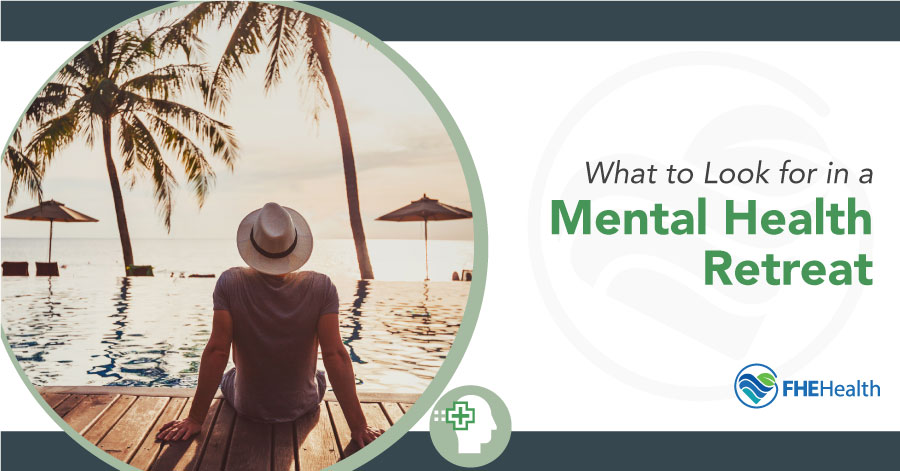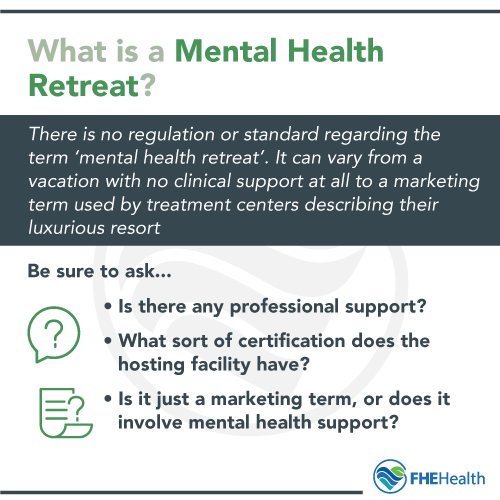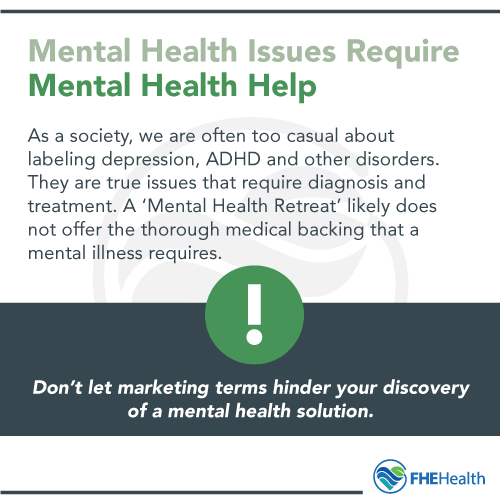
Are mental health retreats for depression, anxiety and fatigue worthwhile ventures? Some organizations promise a break from day-to-day stress with a mental health retreat. They use the term “mental health” loosely to define this experience as a day of rest and relaxation. That’s quite different than getting help for a true mental health emergency. Yet, many people can benefit from a mental health retreat.
Why You May Feel a Mental Health Retreat Is Right for You
 Americans are stressed out. In its 2017 Stress in America survey, the American Psychological Association found people are worried about many things, including the future of the country, having access to health care and having a job. It also reported that three out of four people experienced at least one symptom of stress in the previous month, such as staying awake at night or feeling anger.
Americans are stressed out. In its 2017 Stress in America survey, the American Psychological Association found people are worried about many things, including the future of the country, having access to health care and having a job. It also reported that three out of four people experienced at least one symptom of stress in the previous month, such as staying awake at night or feeling anger.
A lot of things can make you feel mentally drained and stressed, leading to a need to take a break to clear your mind and refocus your life. You may need a mental health retreat if:
- You are overwhelmed with the tasks you need to complete each day.
- You don’t find joy in the things you used to.
- You hate your job, you hate the list of chores you have to do, and you can’t make yourself do them.
- You feel anxious about your future because of things happening today.
- You’re depressed with where your life is.
You may feel this type of stress from within your own mind, within your family or in direct relation to your job or school. When you get to this point, it’s time to think about taking a break. In these situations, it may be okay to start with a mental health day — a day off from what’s exhausting you. For others, there’s a need for more time.
What Is a Mental Health Retreat?
 Some resorts and spas promise a mental health retreat to their guests. Frankly, it’s important to read between the lines. Some of these retreats are simply a day at the spa or, perhaps, a massage appointment. The phrasing is simply a marketing ploy to get you to book an appointment.
Some resorts and spas promise a mental health retreat to their guests. Frankly, it’s important to read between the lines. Some of these retreats are simply a day at the spa or, perhaps, a massage appointment. The phrasing is simply a marketing ploy to get you to book an appointment.
Other locations offer one- or two-day retreats. These may be a good way to take a break for yourself if you are looking for relaxation. Most people can see how spending a few days at a luxury resort with access to massage therapy, rejuvenating spring baths and a too-soft mattress can work to help them relax. There’s no reason to avoid these types of experiences. Just don’t expect a true mental health treatment plan.
Are Health Retreats Worth It?
Before you choose a mental health retreat, consider the following:
- What specifically will you experience?
- Does the location promise an opportunity to speak to a licensed counselor about your stress?
- Does the opportunity give you more than just a bit of pampering?
For those feeling anxious, depressed or overwhelmed with life, a basic mental health retreat like this may be ineffective and even a waste of time.
True Mental Health Problems Require True Mental Health Care
It’s easy to point fingers and say that mental health problems are things that happen to someone else. You feel as though you can cope and just need to get through the day. Unfortunately, in some instances, you need professional help to get you there. Realizing that is a good thing.
It’s not uncommon to experience mental health illness. In the United States., one in five adults, or 46.6 million people, experience some form of mental illness in any given year, according to the National Institute of Mental Health.
The things you do every day that create stress — work, manage a household, interact with family and maintain social relationships — can trigger predisposed tendencies toward mental illness. In other words, sometimes, the mental health problems you feel are more than just exhaustion and stress. They are true mental health issues that require real mental health care.
When Should You Seek Mental Health Care?
Knowing the difference between needing a mental health retreat day and mental health care isn’t always simple. However, look for these warning signs:
- You’re experiencing anxiety that’s debilitating. Anxiety can be a mental health disorder when it becomes hard to control. You may get panic attacks from it.
- You’re pulling away from the things and people you love. Things that used to make you happy no longer seem all that interesting.
- You’ve experienced outbursts of anger. You’ve engaged in risky behavior because you feel so overwhelmed.
- You feel hopeless. You’re so overwhelmed by what’s happening that you feel like it just isn’t going to get better.
- You’ve had a significant change in your personality. You don’t feel like yourself anymore.
Many people say things like, “I’m OCD about organization” or “Sorry, I’ve got ADHD and can’t focus.” This isn’t a true diagnosis.
True mental health problems require a real diagnosis from a licensed professional. Getting help is possible. Don’t make light of the way you’re feeling.
There may very well be some mental health retreats aimed at improving mental health issues like these. But the truth is, these diagnosable conditions should receive medical attention. Without the stressors of life, many conditions do improve, but you need therapeutic support and, often, medical support to reintegrate into your normal life.
Consider a Mental Health Retreat with Medical Support
When you consider where you are right now, ask yourself if a getaway is right for you. Staying at a residential treatment center can be the getaway you need to restore your well-being. Residential treatment centers can offer:
- A safe place for you to work through and understand what’s happening to you
- An environment that’s full of holistic help and positive encouragement
- A break from your daily life to reduce stress
- Treatment for underlying mental health problems you didn’t know you had
- Support for your long-term care and well-being
It’s okay to recognize the value of a treatment center like this. In truth, this is perhaps the best option for those seeking mental health retreats for depression, anxiety, bipolar and other mental health conditions.
For the Best Level of Care, Contact FHE Health
Mental health is nothing to overlook or downplay. At FHE Health, we work closely with our patients to ensure they’re living their best life. To get started, contact one of our dedicated, compassionate counselors to schedule a consultation with us. Call us 24/7 at (833) 596-3502.






